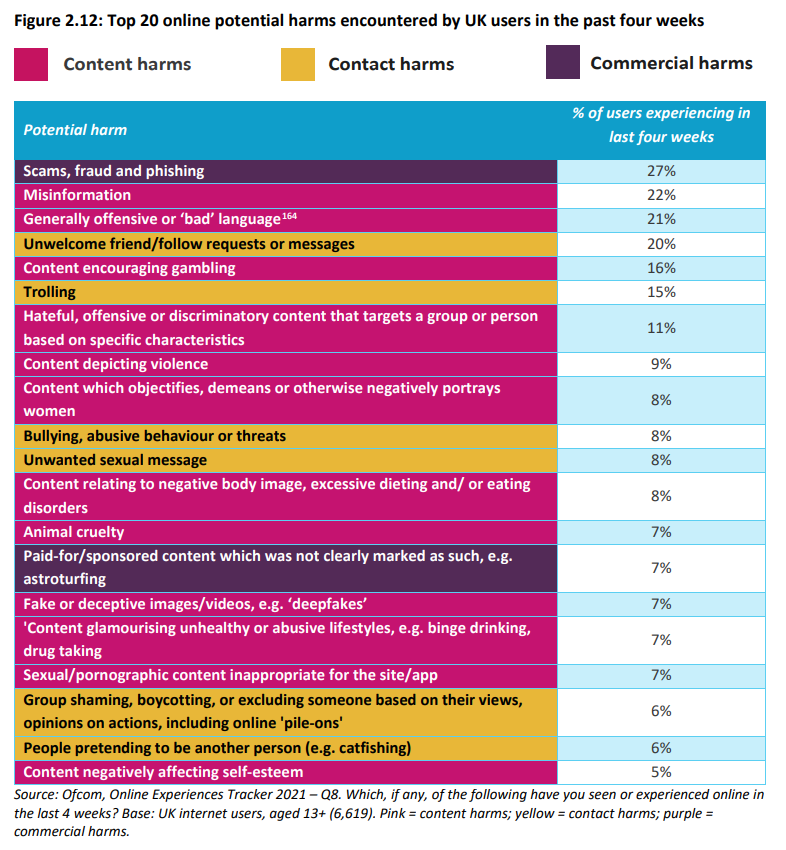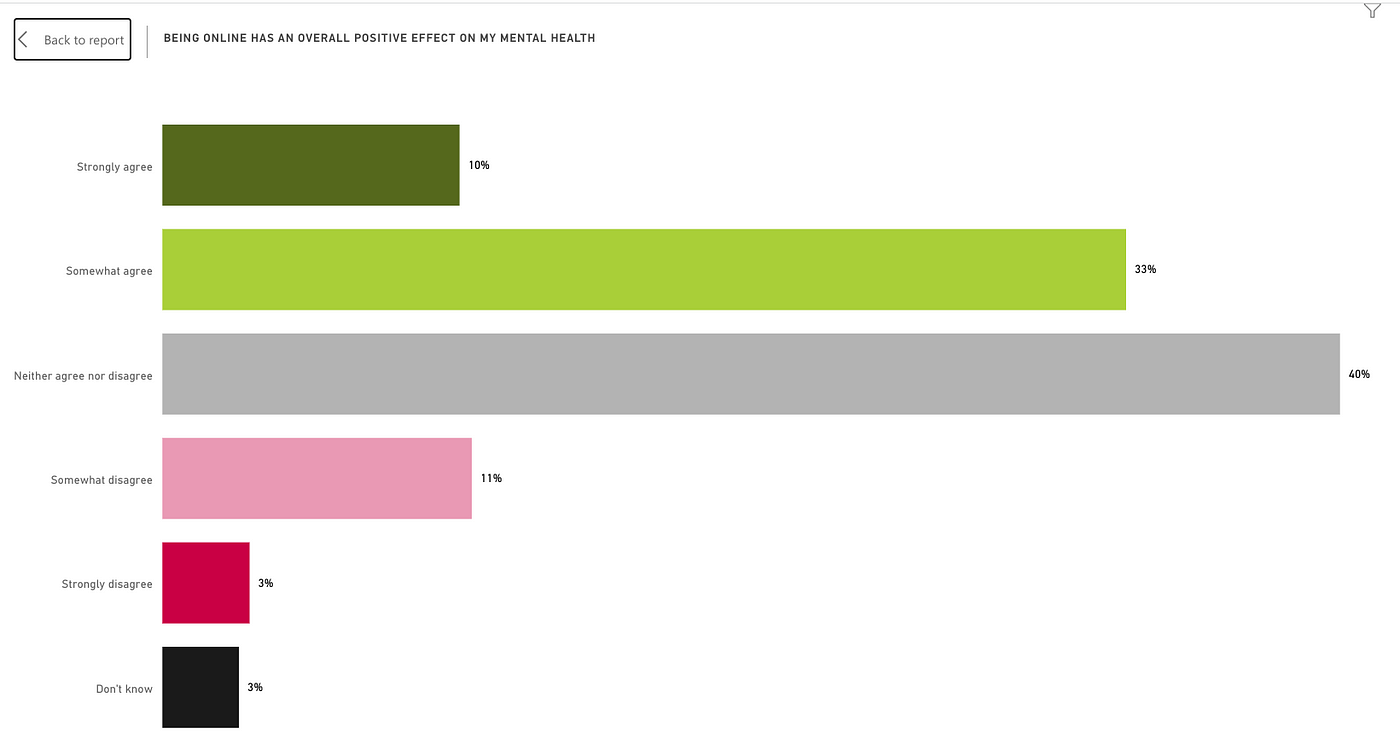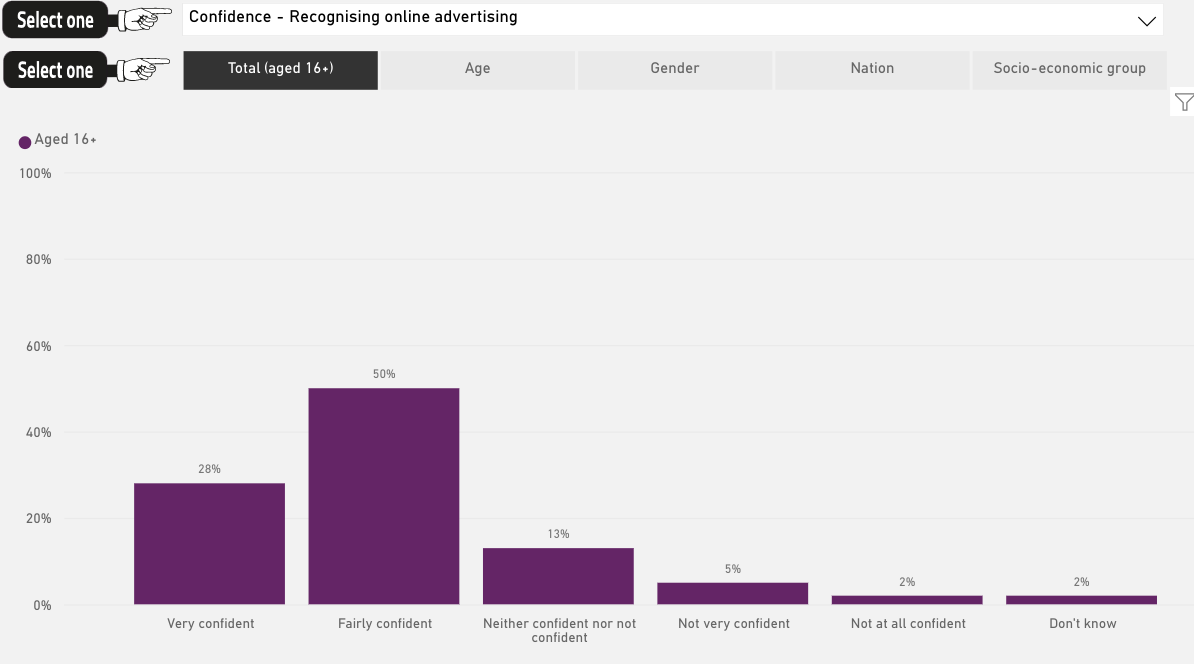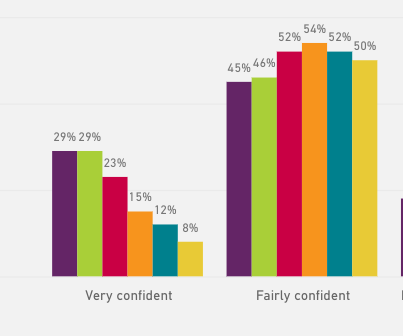As the UK gets ready to regulate harmful (including legal but harmful) speech online, the appointed regulator, Ofcom, released its annual survey of users. It’s informative to see just how concerned UK citizens seem to be about the internet. Not terribly.
First, a list of potential “harms” encountered.

Let’s look at these. Scams (27%). Yes, We get those through every possible medium: phone, mail, and net. Misinformation (22%). Well, that requires definition. “Generally offensive or ‘bad’ language” (21%). Oh, that is so broad; it is in the ear of the beholder; and — even without a First Amendment — does government want to be in the position of policing “bad” language? Unwelcome friend requests (20%). Sounds like a bad cocktail party; one may easily walk away. Content encouraging gambling (16%). Gambling is legal in the UK and promoted by many newspapers, which profit from it.
The sixth and seventh complaints are ones worthy of attention and are mostly native to online: trolling (15%) and discriminatory content (11%). Other categories worthy of attention include objectification of women, bullying, unwanted sexual messages, and content about body image (each 8%).
Now how concerned are these users about their complaints? 15% are “really bothered.”

What did the complainers do about it? 30% scrolled past, 20% reported it, 20% unfollowed whoever posted the offending content, 18% did nothing, 11% closed the app or site…
That’s the complaint side of the report. It does not alarm me about the extent of online harm users are reporting to their regulator.
To its credit, Ofcom also asked about the benefits of the net for its citizens. These results are striking.
“Being online has an overall positive effect on my mental health.” Only 14% disagreed; two and a half times more users agreed that the net is good for their mental health.

Oh, but isn’t the net addictive and taking over our lives? To this statement — “I feel I have a good balance between my online and offline life — a solid majority of 74% agree; only 9% do not.

“I can share my opinions and have a voice.” I consider this a critical difference between the net and mass media. 44% agree; only 17% disagree; a third don’t share an opinion about sharing their opinions.

“I feel more free to be myself online.” A third agree; almost a fifth disagree; half, being British, shrug.

Many people see the net less as a means of self-expression and more as a useful helpmate. “Accessing goods and services online is more convenient for me.” A whopping 83% agree; a mere 3% disagree.

Rather than being imprisoned by the desires of algorithms, it seems people see themselves as individuals following their own desires. “It gives me space to pursue my hobbies and interests.” Almost two-thirds — 63% agree — while 11% do not.

So far, as I read the survey, people feel predominantly positive about their use of the net and they do not seem terribly concerned about their complaints. The reason for a regulator to step in would be if users thought themselves incapable of handling problems there. Ah, but UK internet users do not paint themselves as desperate. To the contrary, they are confident: 79% call themselves very or fairly confident as internet users; not so much, 8%.

Well, what about attempts to pull the wool over their eyes by unscrupulous marketers? How confident are they that they can recognize online advertising? 78% are; 7% are not.

But data is/are a problem, everyone agrees, yes? Sure people feel they have lost the ability to manage their personal data online? Not so. A majority — 58% — are confident managing their data; 18% not.

OK, then fake news must be terrorizing citizens. News media say so. How many feel confident judging the truthfulness of online information? 69%; 9% feel otherwise.
 A
A But young people are the most vulnerable to online disinformation — that’s why there are so many interventions to teach them news literacy, right? How do young people compare with their elders? 29% of users aged 16–34 are very confident, and it goes downhill from there.

Most people feel pretty strongly about their own abilities online. But when asked about others, well, they need help. Two thirds of users agree with the statement, “Internet users must be protected from seeing inappropriate or offensive content.”

There we see the third-person effect at work. Coined by sociologist W. Phillips Davison in 1983, the third-person effect “predicts that people will tend to overestimate the influence that mass communications have on the attitudes and behavior of others…. Its greatest impact will not be on ‘me’ or ‘you,’ but on ‘them’ — the third persons.” The third-person effect, I argue in my upcoming book, is the basis of so much regulation and censorship of media since Gutenberg. Ofcom and fellow citizens want to protect them from the internet whether they think they need it or not.
All of this would seem to me to auger against the urgent need for Ofcom and the UK government to guard its citizens from the net.
But perhaps, as we hear in a constant media drumbeat, internet companies are negligent of doing anything to address the problems — problems that humans cause — on their platforms. Ofcom reports the moderation activity of the three big companies:

Facebook took down 153 million pieces of content in the third quarter of 2021 alone, 96% found by its algorithms. Is Facebook censoring too much, as America’s right-wing would claim? Only 2% of its decisions are challenged.
I know I’m being sassy here. I am not arguing against all regulation. The net is already regulated. Neither am I defending its current proprietors. I wish for a more distributed web (a la Jack Dorsey’s Bluesky). But keep in mind that a more distributed web will be much harder for regulators to regulate. And a more distributed web will make it more difficult for moral-panicking media to find folk-devil moguls to blame for all our ills.
Interventions in the internet and our newfound freedom of speech online need to be based on empirical evidence of actual harm, clearly defined. This, it would appear, is not that.
The post How harmful is it? appeared first on BuzzMachine.
